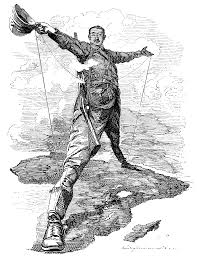
记忆方法
将“imperialist”分解为“imper-”(与帝国有关)和“-alist”(表示支持者或主义者)。可以将其记忆为“imper-”联想到帝国,而“-alist”联想到帝国主义的支持者。所以,“imperialist”可以想象为一个支持帝国扩张政策的人。
以上内容由AI生成, 仅供参考和借鉴
中文词源
imperialist 帝国主义者
词源同empire,帝国,帝权。
英语词源
- imperialist (n.)
- c. 1600, "an adherent of an emperor," such as the emperor of Germany, France, China, etc., probably modeled on French impérialiste (early 16c.); from imperial + -ist. The shift in meaning to "advocate of imperialism" (1893) came via the British Empire, which involved a worldwide colonial system. See imperialism. As a term of abuse in communist circles, attested by 1918. As an adjective by 1816.
权威例句
- 1. They are ready to defend themselves against Uncle Sam's imperialist policies.
- 他们已做好抗击美国帝国主义政策的准备。
- 2. The developed nations have all benefited from their imperialist exploitation.
- 发达国家全都从他们的帝国主义剥削中获益。
- 3. The play is being widely read as an allegory of imperialist conquest.
- 这部剧被广泛解读为对帝国主义征服的讽喻。
- 4. The May 4 th Movement was at once anti - imperialist and anti - feudal.
- 五四运动是反对帝国主义的运动,又是反对封建主义的运动.
- 5. That country is now freed from imperialist slavery.
- 那个国家现已从帝国主义的奴役下解放出来.